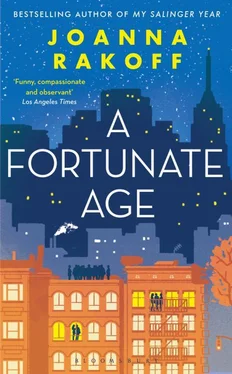Emily tried not to take such statements as a reproach of her own, more optimistic mode, which had led to such extreme disappointment. But there was reproach in his voice, she could feel it, whether Curtis intended it or not, and she told herself not to be bothered by it, for if she allowed herself to be offended on this count there was no turning back, the gates would open and it would all be over. At work, over the long, dull day, she found herself dwelling on this small injury. It was one thing, she thought, for her friends, who had known her for so long, to express anxiety over her future or her well-being (though, of course, it annoyed her when they did so). It was quite another for Curtis—who was younger than she, who had barely struggled—to criticize her, to act as though she was to blame for everything that had happened, when she had been cheated, wronged, taken for a ride, and when he didn’t know the first thing about theater, anyway, about how things worked, how promises were made.
This line of thinking troubled her, for it smacked of Clara, who eternally believed herself cheated, wronged, taken for a ride by anyone who’d crossed her wayward path. And lately a new worry had crept into Emily’s tired brain: that she would end up like her sister, talking to her demons on a street corner. Clara was on her mind, as she seemed to be all Emily and her parents spoke of these days. Back in May, Clara had been found in a roadside motel off 70, ranting about a patient of their father’s, a skinny high school student who, she said, had broken into the room, raped her, and stolen her “meds.” Indeed, there were no meds on the premises, but this appeared to be because she’d taken them all herself and, as a result, entered into what the ER doctor called a “drug-induced psychosis.” Emily’s father, for the most part, concurred and a day later, the Kaplans drove Clara up to a facility in Vermont. Now, every afternoon around four, Emily picked up her line at work and heard Clara’s low, cigarette-scarred voice complaining about the food, the know-it-all psychiatrist, and the crazy people in her group sessions. “They’re all crazy -crazy, know what I mean? Not like me.”
Meanwhile, Emily knew, from talking to her parents, that the institute was on the verge of kicking Clara out for refusal to cooperate. “She lies,” her mom explained. “She simply will not tell the truth about anything in her sessions. She lies to her psychiatrist. She lies to the nurses, to the other patients in group. And she refuses to take blame for anything. It’s all part of the disease.” Emily asked why, then, they were planning on letting Clara leave. Shouldn’t she stay until they’d cured the disease? “Yes and no,” her mom said, clicking her tongue impatiently. “Hasn’t your father explained this to you? They used to think Clara had a mood disorder. Mood disorders are stabilized pretty easily with medication. You know this, Emily, you took psych”—Emily’s parents were fond of reminding her of this, by way of suggesting that she had other skills, that she could leave this ridiculous acting business anytime and become a therapist, like her father—“but Clara never responded well to any of the medications. They never really worked. You know.” Emily did know. What she didn’t know was why her mother felt the need to rehash Clara’s sad history each time Emily asked a question about her sister’s current situation.
“So now, this new doctor says the other doctors were wrong. She has borderline personality disorder—”
“Mom, I know . But I don’t get why the doctor is trying to send her home for lying, if lying is a symptom of her disorder.”
“It’s because of money , Emily. Personality disorders take time —months, years—to treat. You can’t just give someone like Clara a pill and send them on their way. The doctor thinks Clara would need to stay at Brattleboro for a year in order to make some real progress. And there is absolutely no way we can afford a year at that place. The well has run dry, my dear.” She let out a brittle laugh. “Since she can’t stay long enough to be treated properly, there’s no point in keeping her there for much longer, unless she has some sort of breakthrough.”
“What does that mean?” Emily asked.
Her mother sighed. “She needs to start talking. Or show some sign of progress. Like that she’s in touch with reality.” For the time being, she told Emily, they were giving Clara “coping classes,” which would help her develop techniques for managing her anger, for keeping the various elements of her life in check. She was learning to draw up lists of pros and cons, which would help her make decisions (she would often become paralyzed at, say, the grocery store, unable to choose between Raisin Bran and Special K), to balance her checkbook, to keep a calendar on which she would write down the due date for her rent and credit card bills and shifts at work, and other seemingly basic human activities that Clara had never mastered.
“Isn’t there anything else they can do?” Emily asked her mother. “A different type of therapy? Behavior modification?”
Again, her mother let out a heavy sigh. “Well, I guess that’s what the coping classes are. And they are trying some other things. We’ll see.”
To Emily, Clara actually sounded better. And yet Emily herself seemed, somehow, worse. Each day, her emotions snuck closer and closer to the surface of her skin, threatening to interfere with even the most minor components of her daily life. A week earlier, she’d completely lost her temper when the guy at the post office had refused to accept her credit card without ID, even though she’d been buying stamps from him for years. She’d run home to Curtis, taut with anxiety.
“You’re not mentally ill, okay,” Curtis said, with a shrug, when she told him what happened. “If that’s what you’re asking.”
“I know,” she said. “But, Curtis, I just went crazy . I started screaming at the guy. It was exactly the kind of thing Clara would do.”
Curtis twisted his puffy lips into a smile. “It’s the kind of thing everyone does. Postal workers are assholes.”
“I know,” she said again, looking down at her feet.
“Do you want to talk to my mom about it?” he asked.
“No, no,” Emily said quickly. His parents were both psychiatrists at New York Hospital, on Sixty-eighth Street. He met them for lunch every couple of weeks, and sometimes Emily accompanied him, trying to keep up with the Drs. Lang as they trotted through the building, dropping off papers, conferring with their residents, armies of clean-shaven, short-haired, vaguely pompous young white men in dark suits covered over with lab coats, who eyed Emily and Curtis suspiciously.
Mr. Lang specialized in sexual dysfunction. Mrs. Lang in eating disorders, which, Emily had recently discovered, through rampant Googling, were a type of borderline personality disorder. The Langs made Emily a little nervous, though she knew they didn’t mean to and she should just chill . If anything, Curtis’s parents were overly familiar: Peace Corps vets, like her own parents, who lived in a renovated Victorian—white, with black shutters—in a quaint, lushly landscaped town, with an overabundance of antique shops and bistros. They’d met at Harvard Med and still seemed appropriately fond of each other, both of them tall and thin and long faced, and clad in the sorts of garments worn by affluent suburbanites who wish to broadcast their interest in nature and the various activities one might partake in by way of communing with it.
Now that Curtis and his sister Cordelia were grown, the Langs spent part of each year in Africa, volunteering at an AIDS clinic. Their house was filled with tribal masks and fetishes, which frightened Emily, with their empty eyes. She knew it was politically incorrect of her to feel this way. She also knew that Sadie would have said that Emily’s fear of the masks was really a manifestation of—“a mask for, if you will,” she could hear Sadie saying, with a laugh—her fear of the Langs, Curtis included. For in a way, the problem with her visits to Montclair lay less with the Drs. Lang and more with the way a different Curtis emerged the minute he set foot on their plush lawn: the suburban overachiever, the yearbook photographer, political activist, track star. She didn’t mind this Curtis, but she knew, somehow, that if Curtis were to betray her, to renege the promises he’d made to her, to leave her, that this second Curtis—the Montclair Curtis—would be responsible. For this Curtis—who sweetly brought up the subjects on which he knew his father loved to expound, like T. S. Eliot and North Fork wines—was first and foremost a Lang, and secondarily everything else.
Читать дальше












